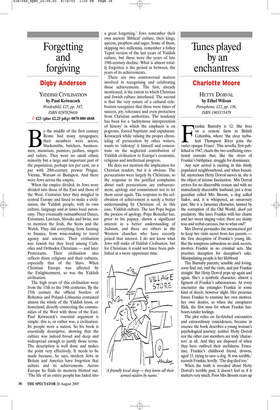Tunes played by an enchantress
Charlotte Moore
HETTY DORVAL by Ethel Wilson Persephone, £12, pp. 136, ISBN 1903155479 Frankie Burnaby is 12. She lives on a remote farm in British Columbia, where ‘the clear turbulent Thompson River joins the vaster opaque Fraser’. This novella, first published in 1947, charts the two conflicting emotional currents that, like the rivers of Frankie’s birthplace, struggle for dominance.
Any new arrival is exciting in this thinly populated neighbourhood, and when beautiful, mysterious Hetty Dorval moves in, she is the object of intense fascination. Mrs Dorval arrives for no discernible reason and with no immediately discernible husband, just a dour guardian called Mrs Broom, a dog called Sailor, and, it is whispered, an unsavoury past. She is a Jamesian character, tainted by the corruption of the Old World, aloof yet predatory. She lures Frankie with her charm and her sweet singing voice; there are dainty teas and verbal caresses, but to what end?
Mrs Dorval persuades the mesmerised girl to keep her visits secret from her parents the first deception of Frankie’s young life. But the temptress unburdens no dark secrets, involves Frankie in no criminal acts. She practises deception for deception’s sake. Manipulating people is her lifeblood.
The Burnaby parents, sensible and loving, soon find out, end the visits, and put Frankie straight. But Hetty Dorval pops up again and again. She’s a symbolic character, almost a figment of Frankie’s subconscious. At every encounter she entangles Frankie in some kind of deceit, however slight. Her presence forces Frankie to examine her own motives, her own desires, as when she enraptures Rick, the first man for whom Frankie harbours tender feelings.
The plot relies on far-fetched encounters and extraordinary coincidences, because in essence the book describes a young woman’s psychological journey; neither Hetty Dorval nor the other cast members are truly ‘characters’ at all. And they are disposed of when they have outlived their usefulness. Ernestine, Frankie’s childhood friend, drowns, aged 15, trying to save a dog. ‘It was terrible,’ records Frankie, levelly. ‘The dog died too.’ When the truth is revealed about Hetty Dorval’s terrible past, it doesn’t feel as if it matters very much. Poor Mrs Broom rears up to make her own great revelation, and that, too, falls flat. What matters is Frankie’s final, successful struggle with her enchantress. Having defeated Hetty Dorval, Frankie can take her place, fully fledged, in the real world.
Hetty Dorval is reminiscent of Edith Wharton or of Ford Madox Ford’s The Good Soldier, but is clearer and prettier than either. Ethel Wilson sketches people and places with marvellous economy — a ‘fluid arrow’ of wild geese, the way Frankie’s father wears his hat. And it has one of the most resonant and suggestive concluding sentences I’ve ever come across. It is a strange little treat.


















































 Previous page
Previous page